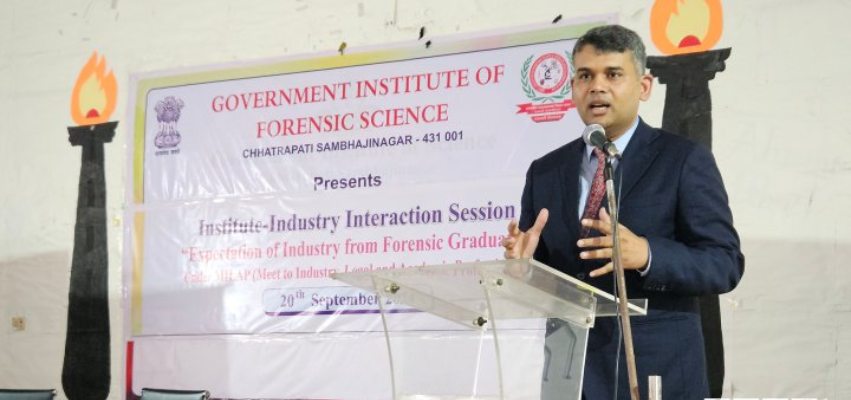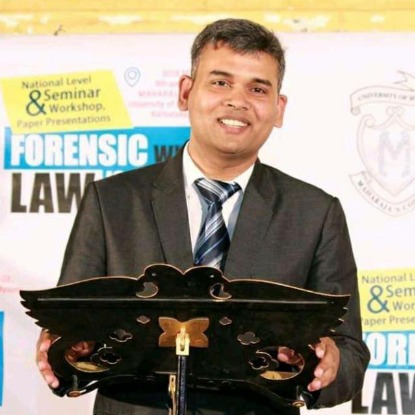
Bridging the Gap: Industry Expectations from Forensic Graduates
As a forensic professional dedicated to bridging the gap between academia and industry, I was honored to speak at the Government Institute of Forensic Science, Aurangabad, during their MILAP initiative—Meet to Industry, Legal, and Academic Professionals.
My expert talk, "Expectations of Industry from Forensic Graduates," provided a platform to address an urgent need: aligning forensic education with industry demands.
The session was an inspiring exchange of ideas, focusing on equipping aspiring forensic scientists with the skills and knowledge necessary to succeed in the competitive professional landscape.
The Industry-Academia Gap in Forensic Science
One of the critical challenges facing forensic education today is the gap between what students learn and what the industry expects. During my talk, I emphasized the importance of aligning academic curricula with real-world requirements. Theoretical knowledge, while vital, must be complemented with practical experience and industry-relevant skills.
Employers in the forensic domain seek professionals who can handle high-pressure situations, analyze evidence with precision, and effectively communicate findings. However, these skills are often underemphasized in traditional academic settings.
Essential Skills for Aspiring Forensic Professionals
I outlined several competencies that forensic graduates must cultivate to thrive in the field:
Technical Proficiency: Expertise in forensic tools is non-negotiable. Practical training in evidence handling and laboratory procedures is equally critical.
Critical Thinking and Problem-Solving: Forensic professionals must approach investigations with a meticulous and analytical mindset, capable of drawing connections and uncovering hidden patterns.
Communication Skills: Writing clear, concise reports and presenting findings effectively in court are as important as technical skills.
Adaptability and Lifelong Learning: Forensics is a rapidly evolving field, and staying updated with advancements is imperative.
Teamwork and Networking: Collaboration with law enforcement, legal experts, and scientists is a daily reality for forensic professionals. Building and maintaining professional networks is invaluable.
Interactive Engagement with Students
What made this session particularly fulfilling was the interactive nature of the discussion. Students posed thoughtful questions, ranging from specific skill sets required by the industry to ways of enhancing their resumes.
I encouraged them to actively participate in workshops, internships, and live projects to gain practical exposure. Additionally, I highlighted the value of certifications in specialized areas like cyber forensics, forensic photography, and DNA analysis to differentiate themselves in the job market.
Networking: A Key Takeaway
MILAP served as an excellent opportunity for students to interact with industry experts and peers. I shared insights into how networking can open doors to mentorships, internships, and even long-term career opportunities.
I urged students to utilize platforms like LinkedIn and professional forensic organizations to stay connected and updated on trends. Forming connections with industry veterans and peers can help them learn from real-world experiences and gain career-shaping insights.
Feedback and Reflections
Hearing the students' enthusiasm and curiosity reaffirmed my belief in the importance of such interactions. Many students expressed gratitude for the practical guidance and shared that the session gave them a clearer understanding of how to prepare for their careers.
Institutions like the Government Institute of Forensic Science are playing a pivotal role in fostering these essential connections between academia and industry. Initiatives like MILAP are steps in the right direction, creating a platform for young professionals to gain exposure to real-world challenges and opportunities.
A Vision for Future Forensic Education
I concluded my talk by advocating for an education model that emphasizes experiential learning, interdisciplinary approaches, and a close collaboration between institutions and industry.
By reimagining forensic education to address these gaps, we can nurture a generation of professionals who are not only technically adept but also equipped to navigate the complexities of real-world forensic investigations.

